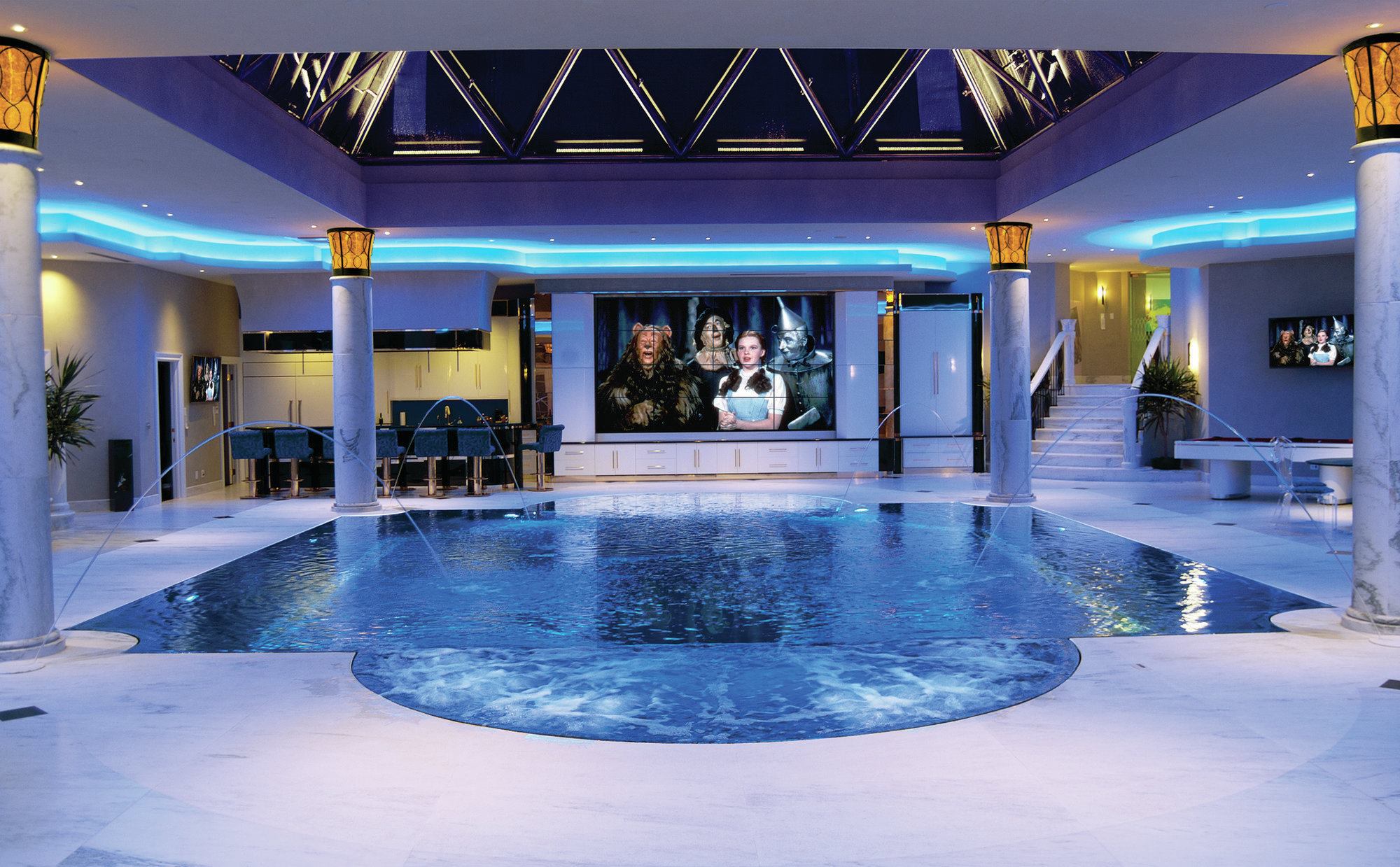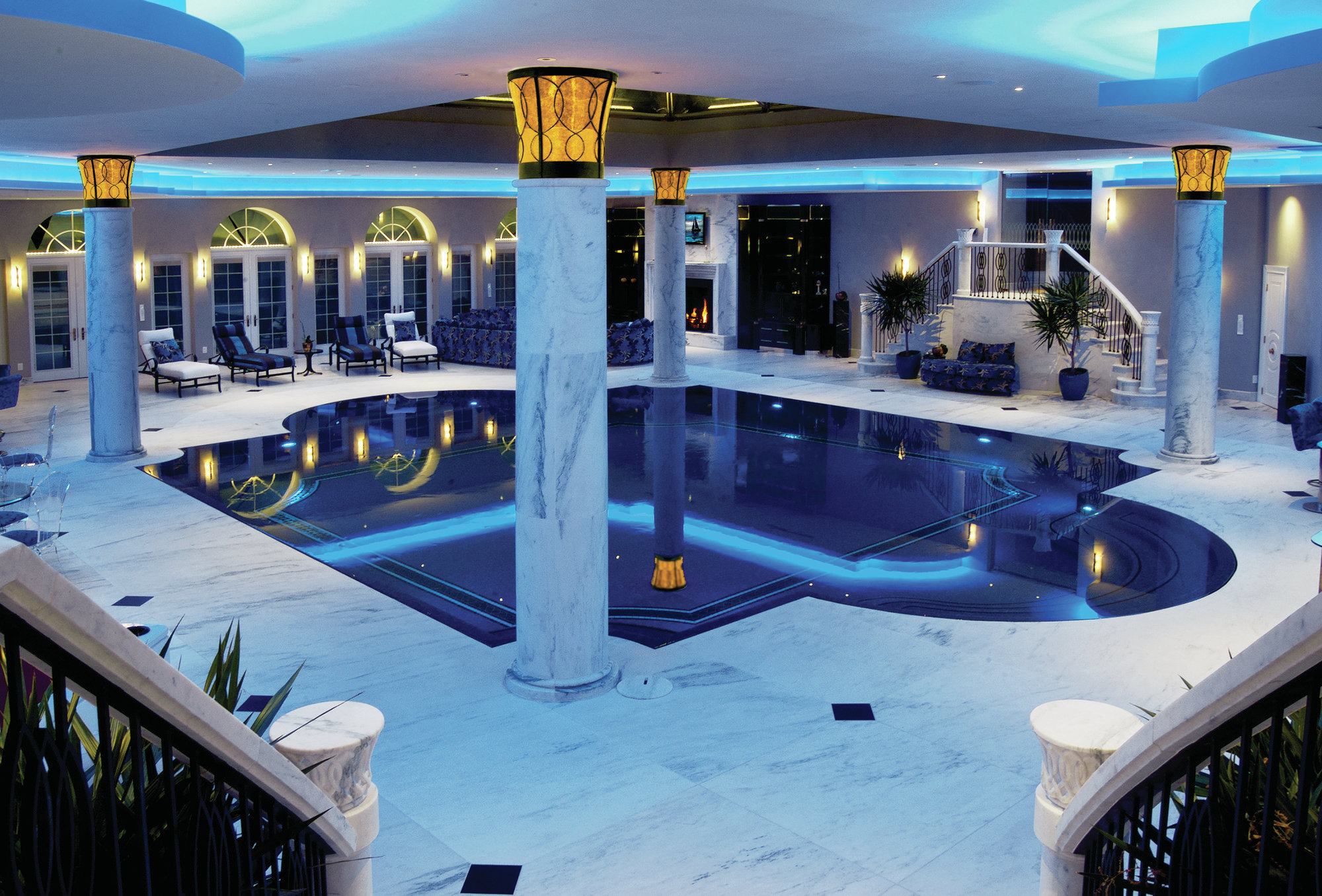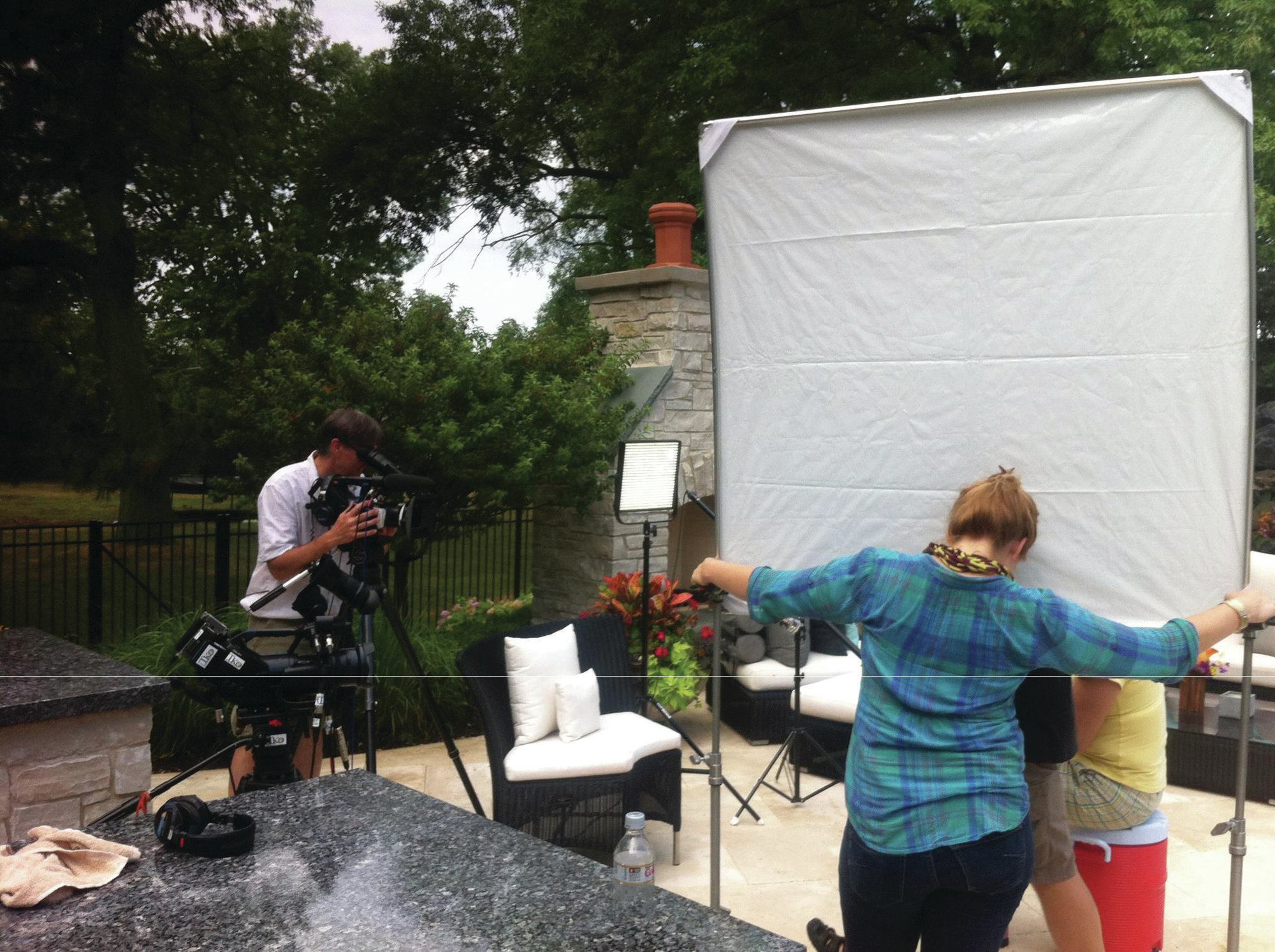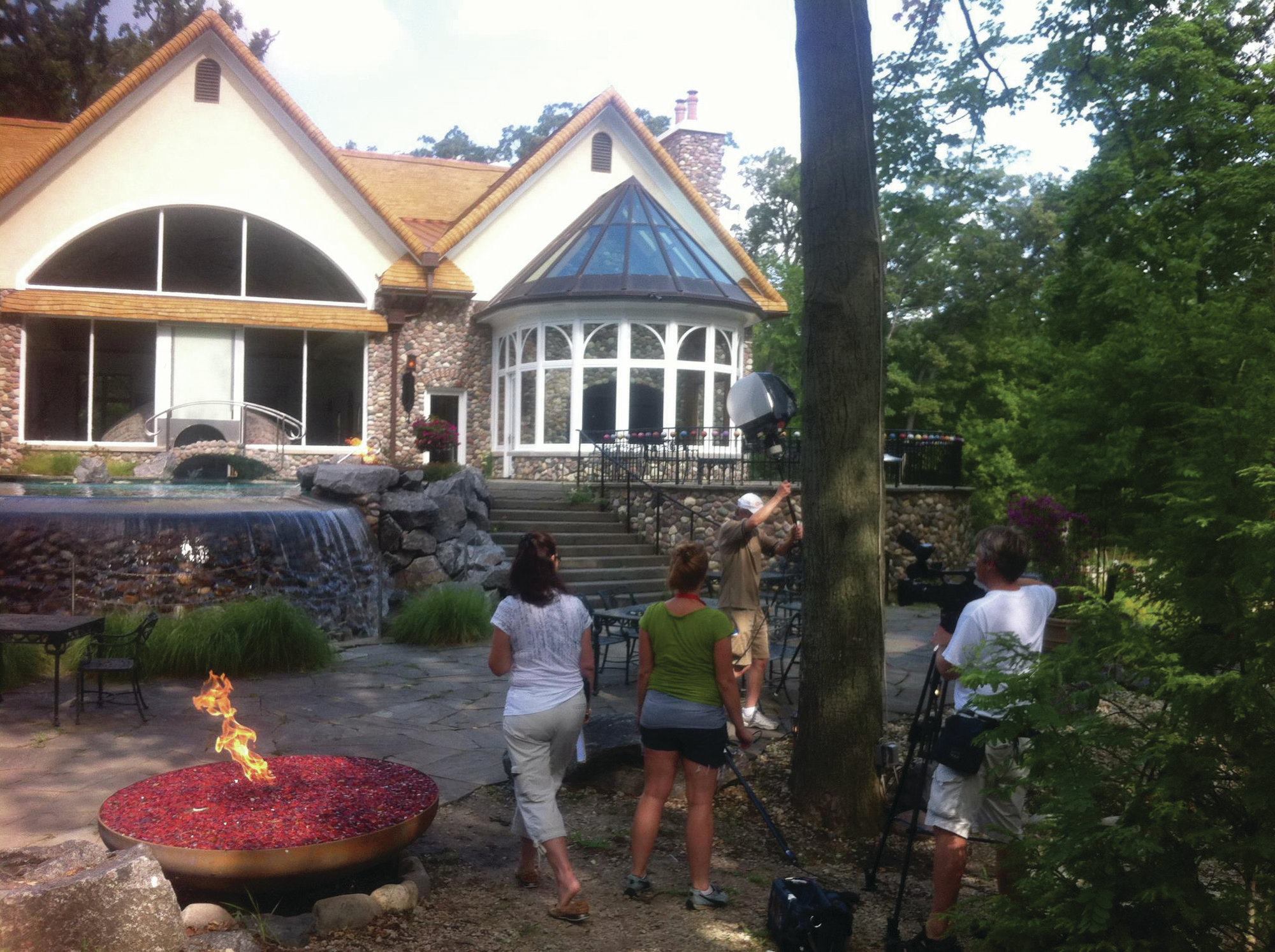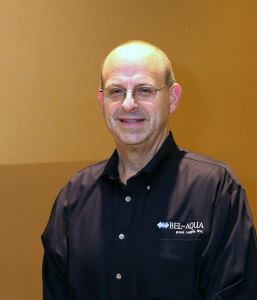PHOTO BY CHRIS NELSON
It was a project truly worthy of being on a TV show about unique pools. The elegant, Mediterranean-looking pool was set in a beautiful, 6,000-square-foot pool house. Overhead was the pièce de résistance — a scaled replica of the glass pyramid above the Louvre Museum in Paris. When producers of HGTV’s show “Cool Pools” spied the project online, they knew it had to star in a segment.
B&B Pool and Spa Center in Chestnut Ridge, N.Y., considered it an honor to be asked, and soon arrangements were being made to film the pyramid pool.The reality TV craze
“Cool Pools” is all about what’s possible when imaginative designers work with homeowners to bring their dream pools to life. It is part of the reality TV craze that took off in the late 1990s with “Survivor” and “Big Brother.” But the home-improvement shows, such as “This Old House,” came on the scene even earlier in 1979.
This trend shows no signs of stopping. By the end of 2013, HGTV was the second most-watched channel on weekend cable programming among viewers aged 25 to 54, surpassed only by ESPN, according to Remodeling magazine.
“The reality TV craze is out of control,” affirms James Atlas, principal at Platinum Poolcare Aquatech Ltd. Two projects by his Wheeling, Ill.-based company have been featured — one on HGTV’s “Million Dollar Rooms” and one on Destination America’s “Epic” show. “There’s a lot of local interest after these shows air,” he relates. “People will come up to me the next day and say, ‘I saw you on TV.’ It’s been a positive for us. It’s another way for [consumers] to see what’s possible for their outdoor spaces.”
Such shows, Atlas adds, are looking for “pretty elaborate pools — at least, that’s been our experience. They see pictures online and they’ll say, ‘We want to showcase the pool. Tell us what went into the planning and engineering.’”
Indeed, such shows have the process down to a science. Typically, the producers, film crew and pool builder will meet at the residence in mid-morning. The endeavor may last 10 hours or more, what with interviews with the builder and, often, the pool owners as well.
It can take three or more hours just to get the “B-Roll” footage — shots of various views of the pool and property — to illustrate things mentioned in the interviews and set the scene. It may entail use of a jib, which is a long extension arm with a camera on one end, and a counterweight and camera controls on the other. The jib can swing out over the pool or swoop high above it for dramatic shots. Sometimes they’ll also send a camera operator underwater to capture different pool angles or swimmers.
“It was quite an interesting process,” says Craig Bagin, B&B vice president. “Years before, I’d done cable stuff, so I had a teeny bit of experience in front of cameras. I know my project and my job, but I’m not an actor. There were a few gaffes.”
Agreeing that the interview process can be a little daunting, Atlas says, “Of course, you’re not perfect, so there are reshoots. The camera is right in front of you, which is kind of intimidating; the producer is off to the side, asking open-ended questions. They want you to do all the talking. They will ask things like, with the Keller project, they were very interested in the limestone bridge, which had to be lifted over the home with a crane [during installation]. They wanted to know all about the process and asked things like, ‘Were you scared it would fall on the house?’”
On any shoot, the TV crew must take many factors into account, especially lighting and sound. “Even though it was outdoors, they set up [reflector] screens all over, to control the environment,” Atlas says, not to mention bringing in extra lights. “And there were microphones everywhere — they needed to control the sound, too.” As Bagin notes, sometimes you can’t run a waterfeature during filming because as nice as that splashing fountain may look and sound, it will drown out the taping of your interview.
Fortunately, the pool builders say, one thing they haven’t had to worry about is how their companies would be portrayed on the shows.
“My general nature is to be a little suspicious,” Bagin admits. “We’ve been in business over 40 years, so our reputation is important to us. But the folks at ‘Cool Pools’ were very professional; they allayed my fears.”
Atlas says he wasn’t concerned: “We’ve turned down [other] reality shows because we were concerned, but they gave me a pretty good idea of what it would be; they wanted to make us look good.”
Indeed, things have gone quite well for both builders since their TV exposure. Bagin reports hearing from several prospective clients after his pyramid pool episode aired, and recently he got a call from an out-of-state client who wanted him to come across the country for a project.
Atlas is looking at the possibility of more shoots. “I’ve been in contact with a lot of producers. They call and ask, ‘Are you doing any over-the-top projects?’” His firm has a couple of very big projects coming up and, he says, maybe they will be featured on a show.
Boon for business
For Barry Justus, the reality TV experience was a bit different. Unlike the other builders, whose projects were filmed after completion, HGTV Canada’s “Pools, Patios, Decks” filmed every project Justus’ company built for six or seven years — as each was being constructed.
“The process was fairly unobtrusive,” recalls Justus, president of Poolscape Inc. in Burlington, Ontario. For each project, he says, they shot a “before” section, “during construction” and a “final.” The HGTV crew was shooting daily, so their schedule was often erratic due to weather, sites not being ready and so forth. He says he often received very short notice that he would be needed on site for filming.
One thing was similar, though: The Canadian show was unscripted.
“We could reshoot a scene multiple times and they would edit out the bloopers. Both my crew and I enjoyed the experience,” Justus says.
The TV exposure proved to be a boon for his business. Justus says HGTV Canada has a wide reach, with shows airing a number of times every week at all hours of the day and night. “We received calls from all over North America. We stopped our advertising efforts, relying on word of mouth and the endless TV exposure from HGTV.
“I definitely sold many projects directly from the TV exposure,” he continues. “Clients feel that they know you, trust you and your work because you are on TV. There is a mentality that you must be good.”
On sales calls, people frequently asked him if their pools would appear on television. “Clients loved having their projects featured,” he observes.
Not only that, but he became something of a local celebrity. “I was out for dinner with my girlfriend,” he remembers, “and a lady approached our table, talking about the HGTV show, and asked for my autograph — me, a pool builder. [It’s] crazy.”
Eventually the show ran its course, Justus says. The ratings were still good, but the producers pulled the plug after a multiple-year run. “We are still busy building pools,” he adds. “It’s all good.”

